- Home
- Paula McLain
Love and Ruin Page 2
Love and Ruin Read online
Page 2
My mother, Edna, was always the North Star in my sky, and also kinder than anyone living. She was warm and intelligent and good all through, and though she’d devoted her life to tirelessly championing women’s rights and was ready, always, to be on the right side of things and people and causes, somehow the campaigns and marches and community speeches never got in the way of her being a mother, or a wife. Every evening she would stop whatever she was doing the moment she heard my father’s key in the lock. Then she’d hurry to the bottom of the stairs just as he sailed through the door, planted his gray felt hat on the wooden stand, and kissed her.
This evening ritual was a tender thing between them and their oldest habit. But it also seemed to be an inked-in promise of the future. Of utter reliability going forward as far as it was possible to see. Of all the kisses to come. I remember feeling, as a child, that it took no effort at all for my mother to be at the door every evening. Time obviously colluded to arrange it—slowing so she could stop everything to be exactly there whenever the door swung open every day. But of course I was mistaken. It took tremendous effort and will, too. And choice, and determination. Other things tumbled so she could be at the stairs. They did, though I had never seen or heard them as they fell.
My father, George Gellhorn, was a celebrated and esteemed obstetrician, with a busy practice and teaching positions at two hospitals, and a glowing, impeccable way of being in the world. He was that pillar father, straight out of a George Eliot novel, managing his family with smooth care, precise as the inner workings of a Swiss timepiece, and his patients, too. And everything.
In his study, there were thousands of books in alphabetical order with their spines perfectly aligned. And he had read all of them. I thought he knew everything there was to know when I was a girl, and everything about me, too. Maybe that’s why I was forever trying to please him and win his approval, so I could finally be the daughter I saw flickering with promise and possibility in his eyes. It was perhaps the greatest difficulty of my life, coming to terms with the truth. Of course that daughter didn’t exist. She never could.
* * *
—
From St. Louis Union Station, I hired a car to take me to McPherson Avenue, where I stood in front of the wide, polished door and let myself fantasize for one long moment about running rather than facing the music. The last time I’d been home, my father and I had fought so terribly I couldn’t remember his words without flinching. And now he was gravely ill, possibly dying.
The door swung open, and my mother was there, looking at me as if I’d lost my senses. “Marty! Come in. You’ll catch your death.”
As she pulled me inside and into her arms, her smell alone undid me. Lavender water and face powder, and good linen. Every moment of my life was hers to hold, the fortnightly dances and Saturday breakfasts, her humming along to running water, or reciting bits of practice speeches she was always working out in her head. Picnic lunches, just us two, at Creve Coeur, near the burbling falls, where I prayed that she would never die. And evenings on our front porch, books tented in our laps as the light faded, and white moths stuck to the screen door.
It was like floodgates opening, being there on the same stretch of the crimson Persian carpet where I had lost countless games of marbles with my brothers. All the distances I had traveled, trying to be myself, didn’t matter here, where nothing ever changed. Not the mahogany furniture or the art or the books in their placement on the shelves. Not the eggshell sheen on the walls, or the quality of light coming through the stained-glass window on the landing. This was the light of childhood. I was all the ages I had ever been.
“How is he?” I asked when I was able to compose myself.
“We’ll know more tomorrow.” Her face was tight and drawn, hard to look at, or to look away from. She was still a beautiful woman and always would be. But I could see her cares etched around her cornflower-blue eyes and along her jawline, and the sleepless nights, too. Silvered strands of her hair had fallen loose from the low knot she always wore, and her navy shirtwaist was creased under her strand of pearls.
I didn’t want to ask if the doctors had mentioned cancer, and couldn’t somehow. The word had been on my mind all the way out from Connecticut, but I simply held it, leaded and razor-edged, as I trailed her quietly to where he was resting. Down the long hall, past the secretary and round mirror, the heavy chandelier, each known thing was sturdy and anchoring, exactly where it should be. At an angle under the stairs, the grand piano sat with sheets of one of Chopin’s nocturnes open on the scrolled music stand, though no one had played it in many years, not since my youngest brother had gone off to medical school in Virginia.
“Is Alfred coming?” I asked.
“At the end of the week if he can get away. He’s just started a new round of courses.”
I waited for her to mention George and Walter, my older two brothers. They were both in the East and married with young children. If they were coming as well, then it really was as awful as I feared. But she only kept walking.
Upstairs, my brothers’ childhood bedrooms had long since been converted to guest rooms, while mine on the third floor under the eaves had been preserved with all the care of a time capsule. I looked forward to escaping there later, but now there was this, my father as thin as I had ever seen him, his complexion nearly gray against yellow linens. He was propped on a pillow, with his eyes closed. But he wasn’t sleeping.
The cable had said that he was suffering terribly with his stomach and that his doctors would operate. Later I would know more, how he’d kept secrets from us for years, fighting to hide his symptoms, his pain, from everyone, even my mother, because he guessed he was dying. During his months and months of silence, things had grown dire.
“Marty’s here,” my mother’s voice called out now.
His eyes opened and his lips tightened over a smile. “Martha.”
I felt very small, suddenly, and that there were two of me, the girl I was and the one he wished he could put in her place. Both loved him but had never been able to say it. Because anger was there, too, side by side with the loving feelings, the wish to hurt him, the wish to pull him close forever.
My mother urged me forward, into the chair that had been pulled up alongside the bed, and then went over to the window seat and opened a newspaper. His hand, when I took it, was thin and riddled with veins, but warm. When was the last time I had held my father’s hand?
“I’m going to be perfectly fine,” he said before I could speak. “I have the very best surgeons in St. Louis.”
“I thought you were the best surgeon in St. Louis.”
The joke was stiff, but he smiled for me before being caught up by a spasm. It took hold, changing his face so that I had to look away, anywhere. When the pain cleared, and he lay there, breathing heavily, taking some water, he said, “I’ve been reading your book. It’s wonderful.”
There it was on his nightstand. The plain paper manuscript of my latest effort, The Trouble I’ve Seen. I had sent it just before Christmas as a gift, though it hadn’t been an easy decision. He hadn’t been able to finish my first book, a novel, and told me so, calling it vulgar. I had worked on it for two years while in Europe, then found a publisher on my own and even gotten a small advance. But you would have thought I’d made a deal on the black market from the way he laid out the terms of his disappointment in a long, impassioned letter. My characters were immoral and frivolous. He didn’t know why I had bothered when there were so many worthwhile things to write about. What Mad Pursuit followed three college girls who were desperate to find themselves, who travel everywhere and take men to bed and contract syphilis, and otherwise stumble along, developing a dingy film of loneliness. Obviously he’d seen my own failings in the pages, though I’d only meant to show him how clever my dialogue was, and how gaspingly well I’d described the sea.
I read his biting letter over and o
ver, fuming and wanting to spit all sorts of terrible things back. But behind my anger was a bottomless kind of hurt. At some point, I crumpled the pages and threw them in the bin, but that didn’t solve anything. Every last word was still with me, way down in one corner of my seething heart, where they ticked and smoked as if they might detonate at any moment.
This latest book was utterly different, a collection of stories about people struck hard by the Depression, and I had taken it on meaning to do social good.
“You really liked it?” I asked him now, unable to keep the plaintive tone out of my voice.
“A lot of it is sad, of course. And I imagine it might be more difficult to get a contract for this one after the reviews you received for the last.” He said it with no malice whatsoever, as if he were talking about eggs, or rain. “But maybe it doesn’t work that way.”
“It does, actually, but I won’t give up. I couldn’t bear working so hard for nothing.”
“Of course you won’t give up.” My mother rose to stand at the foot of the bed. “We Gellhorns aren’t quitters. And for the record, I think it’s marvelous, too. You’ve made those characters come alive. I felt them as terribly true.”
“Thank you,” I heard myself say as I wrestled an array of competing emotions. I wanted my parents to be proud of me and to take me seriously. I also wanted to be well past caring, complete and needing only my own validation. That was the bar I always tried for, anyway.
“We have to be at the hospital at six sharp,” my mother reminded, and then offered a hand. I took it, suddenly as tired as I had ever felt. “Let’s leave your father to rest.”
2
The next morning before dawn, my mother and I got my father downstairs and packed into the car, tucking blankets around his legs as if weather were the problem, and not whatever it was that ate away at him from deep inside. It was beginning to snow.
At Barnes Hospital, they admitted him and then whisked him off through swinging wooden doors while the two of us waited in the cafeteria, drinking terrible coffee, and then moved to a bland visitors’ sitting room. Outside, the storm picked up, dropping a soundless sheet of white. It seemed the only way to keep time, watching the drifts pile higher and higher on the windowsills and on the tops of the cars five floors below us in the parking lot, looking more and more like mounded sugar.
“He’s going to be fine,” we kept telling each other at intervals.
“He is.”
It was a talisman we were braiding back and forth, repeating the words without variation until they were links in a chain of hope, or faith, or whatever lies between.
And then late in the day, one of the surgeons walked toward us carrying his cloth cap in his hands, and I thought I would rather step out of my own skin than hear what he had to say. I could barely stand to watch his mouth move. But then the surprise came. The news was good.
It was cancer, after all, but the tumor had come out easily and whole, and didn’t appear to have spread anywhere else. They would keep my father at the hospital until he was stronger, but there was every reason to be hopeful.
“Oh, thank God,” my mother cried, and we held each other. I felt her shake as we both laughed through tears, and my heart lightened all at once. A magician’s dove set free.
* * *
—
On the way home, later, after we’d seen him and felt even more assured that all truly would be well, we drove miles out of our way to stop at the German bakery at Soulard Market for poppy-seed cakes. In our kitchen, my mother warmed milk in a saucepan, and it felt like Christmas had come again, only with a better gift. The milk went into a heavy mug, and I savored its heat in my hands as she asked how I’d been. Now, on the other side of so much worry and strain, we could finally talk naturally.
I told her all about the borrowed house in New Hartford, Connecticut, where I’d been holed up writing of late. How I loved my little room with its desk that faced a long meadow, and how it felt like an incredible treasure to have months of time, and nowhere else to be, and nothing pressing to think of.
I hadn’t noticed her expression shifting while I talked.
“You should come home,” she said after some silence. “It’s not polite to impose on friends for so long.”
“Oh, Fields doesn’t care.” W. F. Fields was my current benefactor. I didn’t yet think of him as a friend; we hadn’t known each other long. “It’s not like that. He’s never there anyway, since he works in the city.”
“What about his wife?”
“He’s a bachelor, Mother, and his house is enormous. He hardly knows I’m there.”
The moment the words left my mouth, I realized my error. Of course she would be far more troubled by no wife in the picture than the possible impingement on Fields’s generosity. And though she didn’t say these next words, I heard them anyway, reading the tension in her shoulders: What will people say?
“It’s really all right,” I tried to explain. This wasn’t the stuff of tawdry melodrama. Fields had never been my beau or even a conquest. He was a stuffy UN type with an encyclopedic knowledge of China. I’d met him at a party in Washington, and we’d gotten to discussing my writing, and this new work, a collection of long stories based on some of the people I’d met when I was traveling the States as a narrative reporter for FERA, the Federal Emergency Relief Administration. I hadn’t been able to forget those people—that’s all I had said, and that it would be nice to have a place to dive in completely, the way Fitzgerald and Hemingway had had Paris.
“Well, it’s hardly Paris,” he’d replied, and then extended the offer of his weekend house upstate. I saw no reason not to accept. And that was really all there was to it. Later, he made a pass at me when he came to use the house for a snowy getaway, but it had been after three very severe martinis, in his defense, and I had fought him off easily enough. We’d been able to laugh at the whole thing later.
I knew my mother couldn’t hear any of this and feel reassured. So I simply said, “I really can take care of myself,” and then changed the subject to the articles I’d lately been pitching to magazines. For the past several years, I’d made a stab at serious journalism, but apparently didn’t have the right background. Or maybe it was the way I looked. When I could arrange a meeting at all, editors eyed me up and down, taking in my long legs, my good clothes, my hair, and pegged me as more socialite than Junior Leaguer. The only work I was able to find was penning beauty tips for women with time on their hands: youth treatments, suntanning techniques, the latest hairstyles. Twenty dollars for a thousand words. The writing felt mindless and constricting, and required only the smallest sliver of my intelligence or point of view. It chinked away at me. But what alternative was there?
My mother listened without comment as the milk in both our mugs went cold. I knew she wanted more for me, and for me to want more for myself. As a girl I’d written poetry every day, dreaming of literary glory. Now there was bubble bath and cuticle cream, and I was barely scraping by.
“I’d like to have you here,” she said when the evening had grown still, and it was time for bed. “That’s selfish of me, I know.”
“You’ve never been selfish a day in your life.”
“We’ve put some money by. If you want to work on something that’s, well…” Her words trailed as her meaning wavered, but only for a moment. “We’d like to help. Come home. Write here.”
“Oh.”
She hadn’t surprised me, exactly. The last months had been difficult and exhausting for her, and of course she would worry far less about me if I were just upstairs. I felt her watching me as I thought how to answer her.
“It’s a lovely offer,” I finally said. “Let me think about it, if that’s all right?” Then I kissed her, and placed our mugs in the sink, and headed up the stairs quietly, the thick carpet swallowing my steps, while inside, I felt a pinching sensation a
nd small flickerings of panic.
* * *
—
If my parents had had their way, I would never have left college except to win the Nobel Prize in Literature, or for a marriage as long and stable as theirs. But I’d gone to Albany for a newspaper job, instead, where no one had ever written deathless prose or poetry, covering wedding announcements and women’s society luncheons, and trying to live on four dollars a week in a tiny room that smelled of sauerkraut. When that wore me out, I revolted. I took my two suitcases and my typewriter and seventy-five dollars, and sailed to Paris.
I’d tried for journalism jobs there, too, all well over my head, I was quickly informed. So I became a junior shampoo girl instead, writing when I could, and sleeping very little, and buying fistfuls of violets rather than breakfast whenever I was feeling down.
Meanwhile, my parents worried, first silently, and then openly. My father began to lob letter after anxious letter at me, meaning to bring me home, no doubt, or to settle me down in some other way. But they only made me want to live faster, and cast a wider net.
That’s how I met Bertrand de Jouvenel, a smooth, good-looking, and very married left-wing French journalist. It all happened so quickly I didn’t have time to weigh my own questions. He’d once been the storied and much-sought-after lover of Colette. She was his stepmother, and had seduced him when he was only fifteen. All of that should have sent me running in the opposite direction, but I felt only intrigued, and then dazzled by his hunger for me, and the desperation we felt trying to be together when it was impossible. His wife, Marcelle, wouldn’t grant a divorce.
We were involved for nearly five years. Occasionally I would catch a glimpse of what I was doing and bolt away from him, my knapsack stuffed with the tattered draft of my first novel, meaning to finally get serious. But he quickly raced after me, again and again, and the same old chaos resumed.

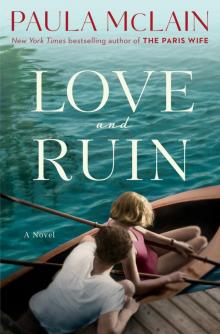 Love and Ruin
Love and Ruin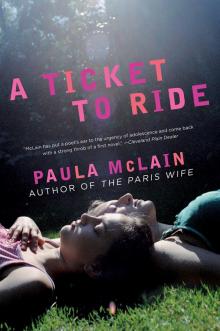 A Ticket to Ride
A Ticket to Ride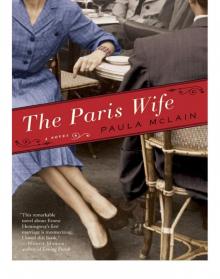 The Paris Wife
The Paris Wife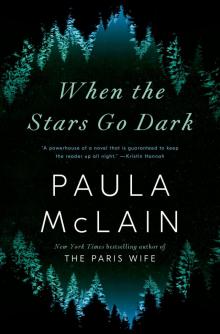 When the Stars Go Dark: A Novel
When the Stars Go Dark: A Novel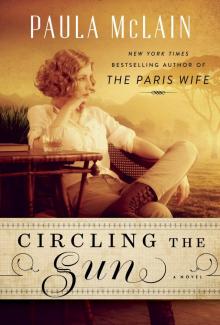 Circling the Sun
Circling the Sun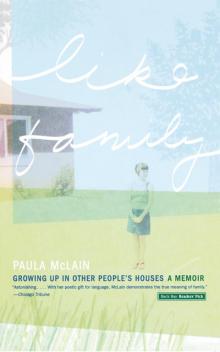 Like Family
Like Family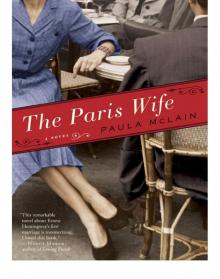 The Paris Wife: A Novel
The Paris Wife: A Novel